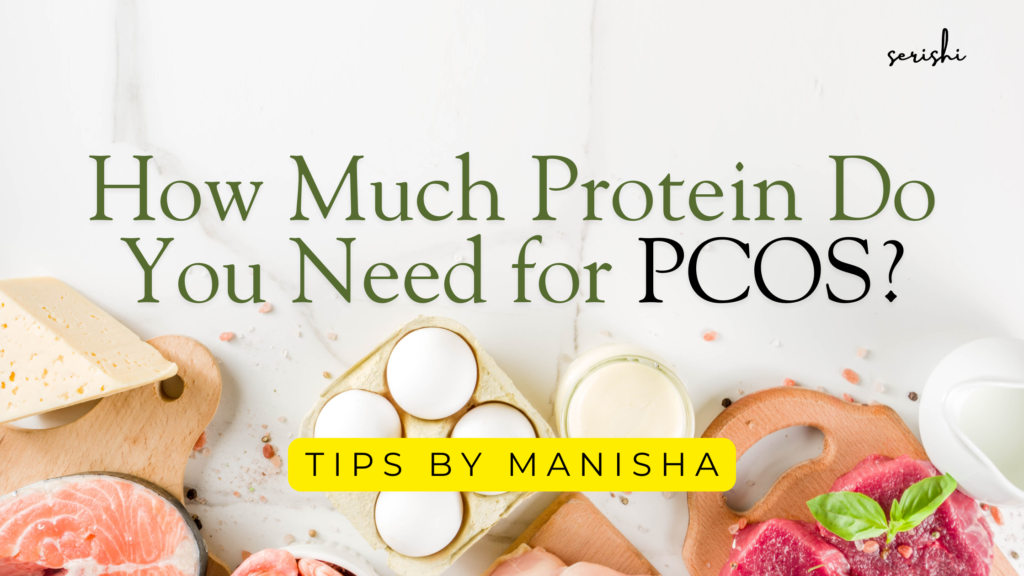Introduction
Protein is an essential macronutrient that plays a key role in hormonal balance, muscle repair, metabolism, and satiety. For women with Polycystic Ovary Syndrome (PCOS), getting enough protein can help manage insulin resistance, support weight loss, and reduce sugar cravings.
But how much protein for PCOS is enough? And what are the best protein sources for PCOS?
At Serishi, we focus on science-backed nutrition to help women manage PCOS naturally. In this guide, we will discuss how protein affects PCOS, the best sources of protein, plant-based protein options, and protein shakes for PCOS.
Quote from Manisha Choudhary
“Protein is one of the most important nutrients for women with PCOS. It helps regulate blood sugar, keeps you full longer, and supports overall metabolic health.”
— Manisha Choudhary, Dietitian & Nutritionist
Why Protein is Essential for PCOS?
✔ Helps Regulate Blood Sugar – Slows glucose absorption, preventing insulin spikes.
✔ Supports Hormone Balance – Reduces androgens (male hormones) and inflammation.
✔ Aids in Weight Loss & Muscle Maintenance – Prevents muscle loss while burning fat.
✔ Keeps You Full & Reduces Cravings – Helps prevent binge eating and sugar crashes.
✔ Boosts Metabolism – Protein requires more energy to digest, helping with calorie burn.
Serishi Insight: A high-protein diet for PCOS can help stabilize hormones, improve metabolism, and reduce cravings.
How Much Protein Do You Need for PCOS?
The amount of protein for PCOS varies depending on age, activity level, and body weight.
🔹 General Recommendation: 1.2 – 1.5 grams per kg of body weight
🔹 Active Women: 1.5 – 2.0 grams per kg of body weight
🔹 Sedentary Women: 1.0 – 1.2 grams per kg of body weight
Example Calculation:
✔ If you weigh 70 kg, you need approximately 84-105 grams of protein per day.
✔ If you engage in strength training, aim for 100-140 grams per day.
Serishi Tip: Spread protein intake evenly across meals to maximize benefits.
Best Protein Sources for PCOS
1. Animal-Based Protein Sources
🚀 Why? Complete proteins that contain all essential amino acids.
🥚 Best Choices: Eggs, chicken, fish, lean meats, Greek yogurt.
2. Plant-Based Protein for PCOS
🚀 Why? Rich in fiber and antioxidants, good for digestion and gut health.
🌱 Best Choices: Lentils, chickpeas, tofu, tempeh, quinoa, nuts, and seeds.
3. Dairy & Dairy Alternatives
🚀 Why? Provides protein, calcium, and probiotics.
🥛 Best Choices: Greek yogurt, paneer, almond milk, coconut yogurt.
4. Protein Shakes for PCOS
🚀 Why? Quick and convenient protein option.
🥤 Best Choices: Whey protein (if tolerated), plant-based protein (pea, hemp, rice protein).
Serishi Insight: A mix of animal and plant-based proteins ensures balanced nutrition for PCOS.
PCOS-Friendly Protein Meal Plan (1-Day Guide)
| Meal | Food Options | Protein Content |
|---|---|---|
| Breakfast | Scrambled eggs with spinach + whole grain toast | 20g |
| Mid-Morning | Greek yogurt with flaxseeds + berries | 15g |
| Lunch | Quinoa + chickpea curry + sautéed vegetables | 25g |
| Evening Snack | Protein smoothie with almond milk, banana & whey protein | 30g |
| Dinner | Grilled fish + brown rice + steamed broccoli | 35g |
Serishi Tip: Distribute protein intake evenly throughout the day for better blood sugar control.
How to Incorporate More Protein into Your Diet
✔ Start Your Day with Protein – Eggs, Greek yogurt, or protein smoothies.
✔ Snack Smart – Nuts, hummus, roasted chickpeas, boiled eggs.
✔ Add Plant Proteins – Lentils, quinoa, tofu, and tempeh.
✔ Use Protein Powder if Needed – Opt for clean, additive-free options.
✔ Balance Meals – Always include protein, healthy fats, and fiber.
Serishi Insight: Combining protein with fiber-rich foods helps in better digestion and absorption.
Protein Shakes for PCOS: Are They Safe?
Protein shakes can be a convenient way to meet daily protein needs, but choosing the right one is important.
Best PCOS-Friendly Protein Powders
✔ Whey Protein Isolate – Low in lactose, easy to digest.
✔ Plant-Based Protein – Pea, hemp, rice, or soy protein for vegans.
✔ Collagen Protein – Supports skin, hair, and joint health.
Avoid These in Protein Powders
🚫 Artificial Sweeteners – Sucralose, aspartame, sugar alcohols.
🚫 Excess Sugar – Avoid products with more than 5g of sugar per serving.
🚫 Added Hormones & Fillers – Look for clean-label brands.
Serishi Tip: Choose unsweetened, organic protein powders for better PCOS management.
Common Myths About Protein & PCOS
🚫 “Too much protein causes weight gain.”
✅ Fact: Protein boosts metabolism and helps maintain lean muscle mass.
🚫 “Plant-based proteins are incomplete.”
✅ Fact: Combining different plant proteins (e.g., lentils + rice) provides all essential amino acids.
🚫 “Protein shakes are bad for PCOS.”
✅ Fact: Clean, natural protein powders can be safe and beneficial.
Serishi Insight: Protein myths can be misleading—focus on balanced, whole-food sources.
Final Thoughts on Protein & PCOS
Protein is a powerful tool for managing PCOS symptoms, improving blood sugar control, reducing cravings, and balancing hormones. The best protein sources for PCOS include lean meats, plant-based proteins, and dairy alternatives. If needed, protein shakes for PCOS can be a convenient addition.
At Serishi, we encourage women to prioritize high-protein meals, make smart dietary choices, and create a sustainable, PCOS-friendly lifestyle.
Quote from Manisha Choudhary
“Protein is one of the most important nutrients for women with PCOS. It helps regulate blood sugar, keeps you full longer, and supports overall metabolic health.”
About the Author
Manisha Choudhary
Sr. Dietitian cum Nutritionist
Founder, CEO – Serishi
Manisha Choudhary is a seasoned Sr. dietitian and nutritionist passionate about helping individuals achieve healthier lifestyles through balanced nutrition. With over 10 years in the field, Manisha specializes in weight management, chronic disease management, postpartum recovery, and wellness nutrition. Her approach emphasizes sustainable, science-backed diet plans that cater to individual needs without compromising on taste or satisfaction. Manisha is dedicated to empowering her clients with the tools they need to make informed dietary choices, transforming their health and well-being one step at a time.

